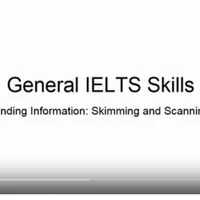Skim and scan skills are very important for the IELTS reading paper, because during the exam you really don’t have much time to read each passage carefully and answer all the questions. You can’t read like you would something for fun at home or an essay for school. On the IELTS, if you take a long time to read each passage, you really won’t have time to answer your questions. We need skills like skimming and scanning to get through the paper more quickly. So, what are these skills?
Skimming and scanning are all about finding information quickly without reading everything carefully. Imagine you come to a long, detailed text on the IELTS exam. The first thing you want to do is to skim the passage. Skimming is finding information about the main ideas, about the topic of the text. You do this by taking a few seconds to look at any information from the title to words that stand out in each paragraph, to diagrams of pictures – anything you can find to get the main idea of the passage before you read it. You can get a lot of information through skimming – you can figure out the structure of the passage and where certain information is located.
Check out: How Important Is English Grammar for Your TOEFL and IELTS Scores?
Scanning is a bit different. You are most likely to use the skill of scanning after you have started answering questions. It involves looking back through a passage and trying to find specific information connected to the question. Scanning is really useful for many questions that ask you to find detailed information or to paraphrase certain words.
Practise skimming and scanning with IELTS reading materials. Nevertheless, you should do this with other things you read as well. Before you read a newspaper article, skim it to figure out what the topic is. Ask yourself comprehension questions related to detail after you’ve read it, go back to the piece of writing and try to find the answers. It is going to help your score on the IELTS reading if you practice these skills a great deal in advance so you can do well on exam day.
Check out: How to Prepare for IELTS



